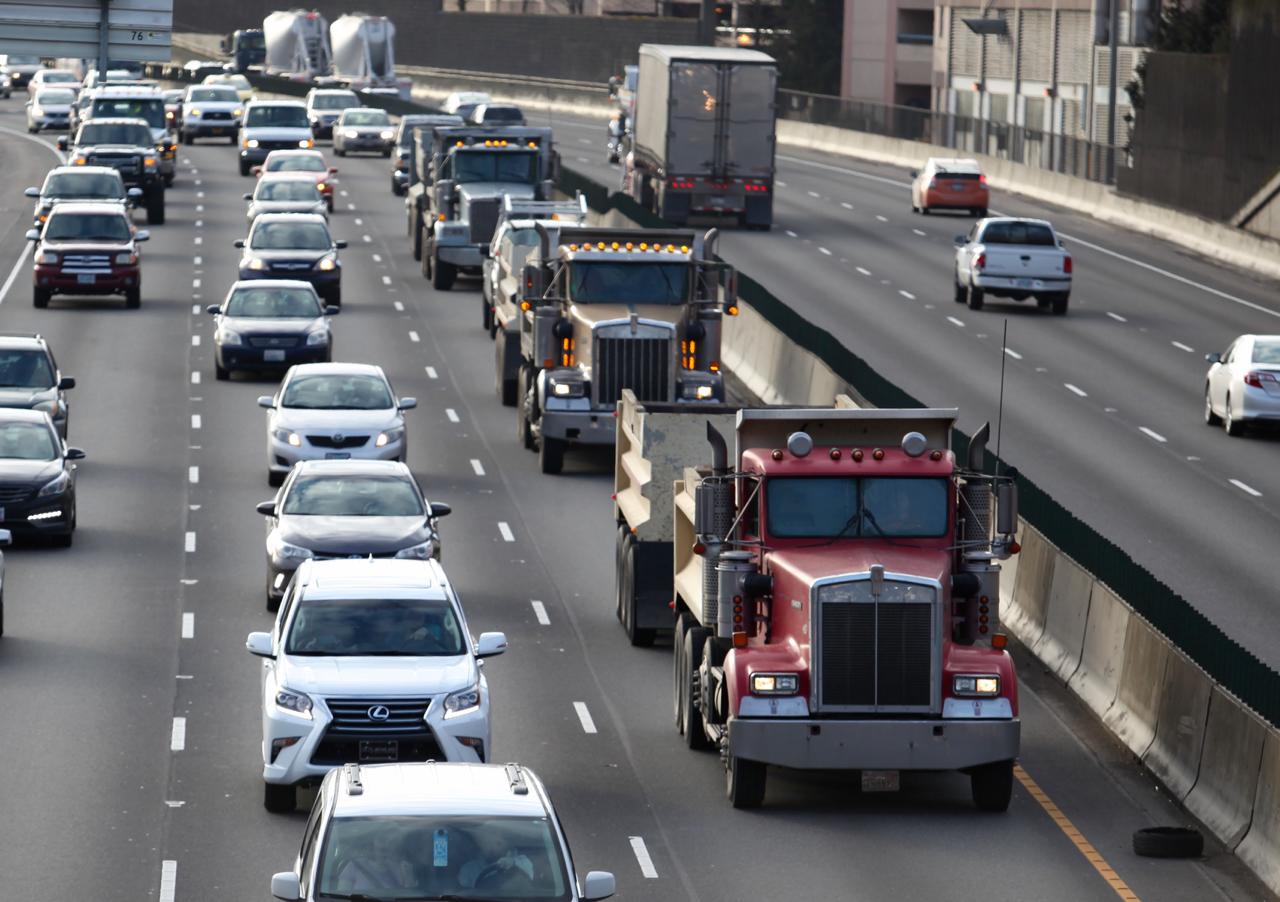
Oregon and Washington are expecting to receive around $185 million to spend on replacing old diesel engines through a settlement with the automaker Volkswagen.
Cassandra Profita/EarthFix
On Tuesday, Oregon lawmakers heard testimony on a new bill that aims to reduce diesel pollution statewide by phasing out old diesel trucks.
House Bill 2007 would phase out older diesel engines in trucks over the next 10 years, requiring that all medium and heavy-duty trucks registered in Oregon be upgraded to a 2010 model engine or newer by 2029.
The proposal would help pay for retrofitting and replacing older engines using $55 million of the money the state won in the 2016 settlement over Volkswagen’s diesel emissions cheating scandal. It would also crack down on idling trucks and add requirements for companies with public contracts to use newer diesel equipment.
Diesel engines made after 2007 are designed to filter out almost all of the harmful particulate pollution that can cause cancer and many respiratory ailments. The 2010 model engines are even cleaner.
The Diesel You Breathe
Hundreds of people die prematurely every year because of diesel exhaust. Enter a location in Oregon or Washington for a look at diesel pollution near you. View the related story.
Published March 23, 2017
The Legislature failed to pass similar diesel engine regulations in 2015 and 2017, but did pass a bill that directed some of the Volkswagen settlement funds toward replacing 450 old diesel school buses across the state.
The new bill is sponsored by a "dream team" of 14 lawmakers, as Rep. Werner Reschke, R-Klamath Falls, noted in Tuesday's House Energy and Environment Committee hearing.
“Most of them are from the Portland metro area,” he said. “What concerns me is doing a state mandate for a problem that might just exist in Portland.”
House Speaker Tina Kotek, D-Portland, a co-sponsor of the bill, said the diesel pollution in her district is 25-50 times higher than what the state says is healthy to breathe.
“I live in a place where we have lots of truck traffic, inner-city deliveries, Swan Island, Port of Portland, Columbia Boulevard, the airport — all the businesses we depend on are right next to where my folks live in North and Northeast Portland,” she said.
Kotek said businesses in her district have told her that they send their old trucks to Oregon because Washington and California have regulations requiring newer, cleaner trucks. She said she’s watched Oregon lawmakers fail to regulate diesel emissions for more than a decade for various reasons, including the economic recession and the 2017 transportation bill.
“This has been far too long in the making,” she said. “There is no excuse at this point to not move ahead.”
Related: 20 Air Polluters Selected For Review Under 'Cleaner Air Oregon' Program
Sen. Lew Frederick, D-Portland, said his district in Northeast Portland has the highest asthma rate in the state because of diesel pollution, and that people have known about the problem for decades – since Interstate 5 was built through one of the poorest areas of the city.
“We need to get something passed that has an impact as soon as possible,” he said. “We have kids and adults who are having problems breathing, quite frankly, in my district because we have so much diesel pollution. It’s not a simple request. It’s frankly a plea. Let’s get something done.”
Bill co-sponsor Rep. Karin Power, D-Milwaukie, noted the pollution problems facing school near highways like Harriet Tubman Middle School, which has installed special air filters and limited students' outdoor activities because of the toxic air around the school.
“What we are exposing our children to at school is putting them in the position of being society’s canary in a coal mine,” Power said.
Many supporters noted the problem of diesel pollution is far worse in low-income and communities of color, and that Oregon is far behind Washington and California in regulating diesel emissions.
Opponents said the requirements to replace diesel engines with 2010 models or newer is overly protective when the 2007 model engines would eliminate most diesel pollution. They also questioned whether the law needs to apply statewide when the worst diesel pollution problems are concentrated in urban areas.
Associated Oregon Loggers asked lawmakers to exempt log trucks from the bill in part because they operate in rural areas, away from the highest concentrations of diesel pollution.
Waylon Buchan with the Oregon Trucking Association testified against the bill, arguing the trucking industry is already subject to a lot of other regulations including the low-carbon fuel standard, and lawmakers could also pass a cap-and-trade bill this session that could raise the price of fuel.
Buchan shared an inventory of in-state and out-of-state trucks and concluded that 82 percent of all the trucks in Oregon are already 2007 or newer.
“The problem is on its way to self-correct as these engines life out and come to the end of their useful cycle,” he said.
He said Washington and California have offered more money to help the industry transition to newer trucks, and the $55 million in VW settlement funds that would be made available through House Bill 2007 would only replace 550 trucks given how expensive they are.
“After this one-time infusion of funds is gone and we’ve eaten the carrot, what does the rest of the industry do faced with these new permanent regulations?” he asked lawmakers. “The stick remains.”
